Impact Stories from Professional Growth Policy Area
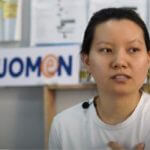
Alumnae of Kyrgyzstan guide new fellows with action plans
Fellow(s): Nazira Sheraly, Aiturgan Zulpukarova, Elena Chigibaeva, Gulzire Minbaeva
Country: Kyrgyzstan
Cohort: 2016, 2017, 2018
Policy Area(s): Education Diplomacy/Mentoring, Empowering Women and Girls, Entrepreneurship, Professional Growth
Although TechWomen 2020-2021 has concluded, country teams continue to work on their action plans, focusing on project implementation with support from seed grants that all 21 teams were offered this year. In IIE’s Action Plan Implementation course, fellows can access comprehensive materials meant to support and guide them. One resource is a video from the TechWomen fellows who founded Techaim — 2016 fellow Nazira Sheraly, 2017 fellow Aiturgan Zulpukarova and 2018 fellows Elena Chigibaeva and Gulzire Minbaeva – that outlines successful program implementation and shares how to create impactful projects.
The AEIF-winning Techaim project provides mentorship to women and girls to grow and develop their STEM skills and expand their knowledge in business, leadership and more. Since it’s launch, the fellows have expanded their programming to include TechKyzdar, a digital skills program for girls launched with support from UNICEF Kyrgyzstan, as well as an online mentorship course for women. In the video, the alumnae emphasize the importance of defining team roles and responsibilities as well as evaluating and monitoring performance, guiding 2020-2021 fellows through implementing a high-impact, sustainable project. In addition to sharing the importance of flexibility and adaptability, the alumnae encourage fellows to stay focused on their mission: “Just like in TechWomen, the brightest result is how the girls change, how they feel empowered and how they want to be mentors, changemakers and inspirational people for the coming generations,” said Aiturgan.
Report Date...: 5/17/21
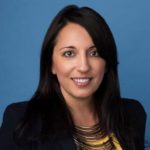
Mentor(s): Sepideh Nasiri
Company: Women of MENA in Technology
Mentor Type: Impact
Policy Area(s): Empowering Women and Girls, Entrepreneurship, Professional Growth
This week, TechWomen mentor Sepideh Nasiri authored a post on
Entrepreneur, sharing actionable ways companies can ensure pay
equity, hire more fairly and creating lasting change from the top
down. Sepideh, a diversity, equity and inclusion advocate, is also the
founder and CEO of Women of MENA in Technology.
“Companies need to take bold and intentional action now; anything
less perpetuates an ecosystem that fails women,” writes Sepideh in
the article. Through her six tips – which include readjusting salary
and benefits, revisiting hiring strategy and approaching diversity as a
spectrum rather than a checklist – Sepideh hopes that companies
can make measurable improvements that better serve employees
and companies. “Recreating the workplace is everyone’s
responsibility,” she said.
Report Date...: 5/17/21
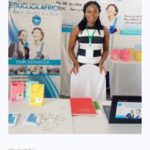
With EduClick Careers fellow connects young people to jobs
Fellow(s): Angele Messa
Country: Cameroon
Cohort: 2019
Policy Area(s): Economic Impact, Education Diplomacy/Mentoring, Empowering Women and Girls, Entrepreneurship, Professional Growth, Youth Engagement
2019 fellow Angele Messa has launched EduClick Careers, a job
portal with a mission to help one million young people access
jobs and other opportunities by 2025. Angele is the founder of
EduClick, an EdTech platform that offers alternative learning
methods for those who don’t have access to formal education
in Cameroon. With both offline and online educational
methods, EduClick supports displaced people, recent graduates
and young professionals who are looking to gain marketable
skills.
In addition to listing the latest job opportunities and
scholarships for young people, EduClick Careers offers
resume/CV assistance, support creating a business plan and
tools to create an online presence. By offering a comprehensive search engine for young people, Angele hopes
to democratize job access, matching talent to opportunity regardless of geographic location and gender.
Report Date...: 5/17/21

Fellow will be first Egyptian instructor on LinkedIn Learning
Fellow(s): Nevien Magdy
Country: Egypt
Cohort: 2019
Policy Area(s): Economic Impact, Education Diplomacy/Mentoring, Entrepreneurship, Professional Growth
During TechWomen, fellow Nevien Magdy and the 2019 cohort had an opportunity to visit LinkedIn for Action Plan Workshop II, where they networked with LinkedIn employees, discussed social impact issues, received feedback on their action plans and spoke about how to use tech for good.
In 2020, Nevien saw a post on the TechWomen Alumnae Facebook group from LinkedIn Professional Mentor Jacqueline Barrett sharing a call-out for Africa-based instructors on LinkedIn Learning, LinkedIn’s platform that offers video courses taught by industry experts in the technology, creative and business fields. Nevien, the founder and CEO of UXit and Origin Technology Solutions, decided to apply, sending in her resume and sharing how she learned about the opportunity. After working with a production studio in Egypt to create an audition tape, Nevien was accepted as LinkedIn’s first LinkedIn Learning instructor from Egypt. “I was astonished,” said Nevien. “I didn’t expect to be accepted, but they said I was the fastest audition to be approved.”
This fall, Nevien will travel to the San Francisco Bay Area to LinkedIn’s studios to record a course on User Experience and how design leadership impacts the software industry; she expects the course to be published on the platform in 2022. “I would have never reached such an opportunity without being part of TechWomen,” she said.
Report Date...: 5/10/21
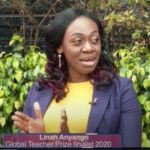
Fellow speaks on students’ reproductive health in TV interview
Fellow(s): Linah Anyango
Country: Kenya
Cohort: 2019
Policy Area(s): Education Diplomacy/Mentoring, Empowering Women and Girls, Professional Growth, Youth Engagement
2019 fellow of Kenya Linah Anyango was a guest on KTN News
Kenya, speaking about the need to focus on girls’ reproductive
health education to improve school attendance and their
participation in STEM fields. The interview was aired on KTN’s Her
Standards show, a platform that shares conversations on gender
equality and women’s empowerment.
Linah is a biology and chemistry educator, EdTech coach and
STEM advocate. In the interview, Linah shared that in order to
make STEM more inclusive for girls, their sexual and reproductive
health must be addressed. In Kenya, an estimated 13,000 girls
drop out of school every year due to pregnancy; one in every five girls between nine and 19 is either a young
mother or pregnant. “Unplanned pregnancies and sexually transmitted diseases have derailed lives of many
promising future engineers or scientists that this country greatly needs,” said Linah. She called for a greater
effort to implement reproductive health policies and sexual education curriculum that will help keep girls in
school. “Provision of age-appropriate comprehensive sexuality education, as part of a wider life-skill and
empowerment learning package will help guide their decisions, with parents and teachers playing their
collective role. Only then, can the efforts to encourage interest in STEM pay dividends,” she said.
Report Date...: 5/10/21

At Veritas fellow learns the meaning of mentorship
Fellow(s): Ayesha Iftikhar
Country: Pakistan
Cohort: 2020-2021
Policy Area(s): Education Diplomacy/Mentoring, Empowering Women and Girls, Professional Growth
2020-2021 fellow Ayesha Iftikhar has authored the latest post on
the TechWomen blog, sharing about her professional mentorship
experience at Veritas Technologies. In her guest post, Ayesha, an
assistant professor and cybersecurity researcher, writes about
her decision to make the best of her professional mentorship in a
virtual setting. Not knowing what to expect, Ayesha found that
her Veritas mentors helped her develop and execute her
professional mentorship goals. “They offered their support with
every possible thing that they could,” she writes.
Although the TechWomen 2020-2021 program concluded, Ayesha’s mentorship has continued, and she regularly meets with her mentors as well as Veritas employees and company leadership. “My professional goals
have evolved. I now know better where I have to reach — I am able to connect the dots. I have found my career path to be really streamlined now, with concrete steps that I have to take to reach my destiny,” she writes.
Report Date...: 5/10/21
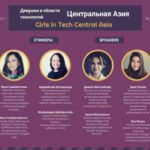
Fellows share advice for girls in STEM at UNDP event
Fellow(s): Maral Hudaybergenova, Shodiyabegim Bakhtiyorzoda, Mahinakhon Suleymanova
Country: Tajikistan, Turkmenistan, Uzbekistan
Cohort: 2016, 2017, 2018
Policy Area(s): Education Diplomacy/Mentoring, Empowering Women and Girls, Professional Growth, Youth Engagement
Last month, fellows Maral Hudaybergenova (Turkmenistan, 2018), Shodiyabegim Bakhtiyorzoda (Uzbekistan, 2016) and Mahinakhon Suleymanova (Tajikistan, 2017) were featured speakers at a webinar meant to engage and inspire girls interested in tech throughout Central Asia. The event was sponsored by the United Nations Development Programme as well as STEM4ALL, a non-profit that offers STEM education to K-12 students.
During the session, the fellows were joined by more than 150 women and girls from Kyrgyzstan, Tajikistan, Turkmenistan and Uzbekistan. The webinar kicked-off with a group discussion on how women and girls are overcoming personal and professional obstacles and succeeding in STEM fields: “I focused on the fact that achieving gender equality requires the engagement of not only women but also men, as it’s everyone’s responsibility,” said Maral. “It’s not about men versus women, it’s all about giving everyone a fair opportunity.” After, the group moved to breakout rooms that were divided by field of interest, where the fellows spoke about both job opportunities as well as the gender barriers and challenges within tech sectors. The event concluded with the panelists sharing free resources for girls and women in STEM. “All of us were trying to inspire girls to not be afraid of pursuing their dream job in spite of stereotypes,” said Maral. “And the most impactful thing for me was the fact that three of five speakers were TechWomen fellows.”
Report Date...: 5/3/21

Fellow featured in UNICEF spotlight
Fellow(s): Noella Nibakuze
Country: Rwanda
Cohort: 2018
Policy Area(s): Empowering Women and Girls, Professional Growth, Youth Engagement
2018 fellow Noella Nibakuze was recently featured in a UNICEF spotlight highlighting her work at MASS Design Group as well as her commitment to uplifting women and girls in her community. The video was a part of UNICEF Rwanda’s Women in STEM series, a campaign that amplifies successful women in STEM fields in Rwanda. Noella is an architect and design associate MASS, working to empower communities through using local and sustainable materials and uplifting their economies.
In the video, Noella explained that her passion for architecture began at an early age: “I imagined myself building skyscrapers, and it really thrilled me to do something so beautiful,” she said. When Noella began exploring a career in architecture, however, she found that she was outnumbered by men: “The main challenge I faced is when I realized the lack of women in the profession itself,” she said. “I really needed the perspective of someone like me.” Noella also shared her perspective on gender equity, and her advice for girls in STEM fields: “I believe a team is more productive and more creative when you have men and women working together. Don’t be afraid to ask for advice on your career. And when you succeed, remember young girls – you can be their mentor.”
Read More »Report Date...: 5/3/21
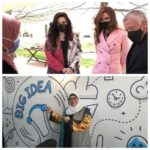
Fellow’s students present projects to King and Queen of Jordan
Fellow(s): Ala’a Agha Karss
Country: Jordan
Cohort: 2019
Policy Area(s): Economic Impact, Education Diplomacy/Mentoring, Empowering Women and Girls, Entrepreneurship, Professional Growth, Youth Engagement
In 2019, founder of Superiors Tech Hub and 2017 fellow Ala’a Agha Karss
collaborated with Princess Taghrid Institute for Development and Training
to design an immersive tech and business training for rural youth in
Jordan. For two months, Alaa’s project, “Productive Youth,” trained its 35
participants in design thinking, digital marketing, storytelling and more,
guiding them on how to create businesses for local and handmade
products.
Last month, Princess Taghrid Institute organized an exhibition to
showcase the students’ projects and products to King Abdullah II bin Al-
Hussein and Queen Rania Al-Abdullah. There, the King and Queen walked
through the exhibit, speaking to Alaa’s students about their training and
seeing their handicrafts and products on display. “I personally witnessed a
long journey for the students, a journey of self-development and creating
their products with unmatched determination,” said Ala’a.
Report Date...: 5/3/21
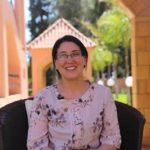
Fellow’s project AfChix expands reach with USAID funding
Fellow(s): Houda Chakiri
Country: Morocco
Cohort: 2012
Policy Area(s): Economic Impact, Education Diplomacy/Mentoring, Empowering Women and Girls, Entrepreneurship, Professional Growth, Youth Engagement
2012 fellow Houda Chakiri is a board member and project coordinator for AfChix, an initiative that addresses the digital gender divide through digital skills trainings, supporting women-led enterprises and advocating for digital inclusion. The initiative – already named a round one winner in 2018 – was recently named a round three winner of the Women Connect Challenge, a USAID-funded challenge that solicits global solutions that transform the ways women access and use technology.
Round three of the challenge, which focused on scale, replicability and private sector partnerships supporting emerging technologies, awarded four initiatives that are advancing women’s digital development. The AfChix project, “Scaling up Women-Led Community Networks for Women’s Prosperity,” will work with community networks in Kenya, Morocco, Namibia and Senegal to harness the power of digital technologies, partnerships and collaborations for the prosperity of women. “We will empower underserved women communities to use technology to improve their livelihoods and small businesses,” said Houda, who will work as Morocco’s project coordinator to identify and customize digital skills and literacy training programs for women. The digital training will be delivered via MOOCs (Massively Open Online Courses) in order to reach the most women in Africa, and will focus on using smartphones, digital marketing, working with online customers and more. “We hope to reach one million women aged 18 and above to strengthen their participation in the digital society,” says Houda.
Report Date...: 4/26/21

